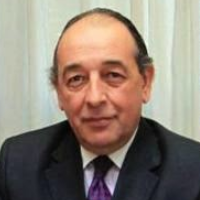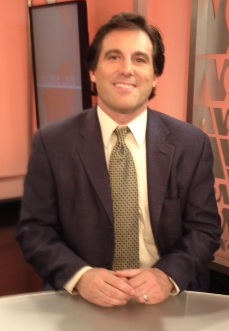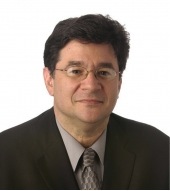CSID Spotlights Tunisia's Historic
Elections in Washington DC

Tunisia's Landmark Presidential Elections: Referendum, Revolution, or Restoration?
 Radwan Masmoudi laid out CSID's vision for democracy promotion in Tunisia,
Radwan Masmoudi laid out CSID's vision for democracy promotion in Tunisia, debate in Tunisia about the course of the revolution. He hailed the success of Tunisian elections including high participation, electoral functions, a peaceful and safe environment, the fact that second elections and a peaceful transfer of power boded well for the future. He said that while there were legitimate concerns shared by many Tunisians about a counter-revolution, this was a very low probability outcome given that the Tunisian revolution had passed a "point of no return and the "genie was out of the bottle." Vibrant civil society, a culture of democracy--including a new culture of protest--and a strong political opposition were likely to keep whatever government came to power accountable. A somewhat higher probability outcome was that security challenges
debate in Tunisia about the course of the revolution. He hailed the success of Tunisian elections including high participation, electoral functions, a peaceful and safe environment, the fact that second elections and a peaceful transfer of power boded well for the future. He said that while there were legitimate concerns shared by many Tunisians about a counter-revolution, this was a very low probability outcome given that the Tunisian revolution had passed a "point of no return and the "genie was out of the bottle." Vibrant civil society, a culture of democracy--including a new culture of protest--and a strong political opposition were likely to keep whatever government came to power accountable. A somewhat higher probability outcome was that security challenges was generally not an optimist, she was relatively optimistic for Tunisia as long as a number of remaining pieces fell into place. She said that Tunisia's October legislative elections had not been well reported in the American press, which focused on a "huge victory" for Nidaa Tounes and a "substantial loss" for Ennahda. The major complication with this narrative was that Nidaa Tounes was unlikely to be able to govern without an alliance or a coalition with Ennahda. While a mathematical possibility does exist for a Nidaa-led majoritarian governing coalition, but it would likely be unstable and beholden to smaller, ideologically-opposed parties. On the other hand, since Nidaa had campaigned on a largely anti-Ennahda platform--that Ennahda would take Tunisia "back to the dark ages"--cooperating with Ennahda will be problematic, and complicated by Ennahda's understandable desire to cooperate in national unity to keep participating in governing. The presidential elections added a new wrinkle, in that runner-up Marzouki attracted much of his support not because of his personal popularity or his program, but because of opposition to Nidaa from a significant
was generally not an optimist, she was relatively optimistic for Tunisia as long as a number of remaining pieces fell into place. She said that Tunisia's October legislative elections had not been well reported in the American press, which focused on a "huge victory" for Nidaa Tounes and a "substantial loss" for Ennahda. The major complication with this narrative was that Nidaa Tounes was unlikely to be able to govern without an alliance or a coalition with Ennahda. While a mathematical possibility does exist for a Nidaa-led majoritarian governing coalition, but it would likely be unstable and beholden to smaller, ideologically-opposed parties. On the other hand, since Nidaa had campaigned on a largely anti-Ennahda platform--that Ennahda would take Tunisia "back to the dark ages"--cooperating with Ennahda will be problematic, and complicated by Ennahda's understandable desire to cooperate in national unity to keep participating in governing. The presidential elections added a new wrinkle, in that runner-up Marzouki attracted much of his support not because of his personal popularity or his program, but because of opposition to Nidaa from a significant  made positive adjustments between the legislative and presidential elections, proof the "seriousness and rigor" in their execution. He commented that the elections were not "existential" or even "euphoric" as in 2011, which he took as a positive sign that elections had become a dependable, credible feature of Tunisian political life. He said that his impression from observation was that Tunisians are now seeking good governance more than the political positioning of the campaign, and that the government has to do a better job (like most governments) of managing expectations. While youth did not vote in sufficient numbers, tens of thousands were deeply involved in the electoral process with the campaigns, as polling agents, as roughly half of polling station workers, and as a large percentage of the tens of thousands of citizen electoral observers, demonstrating engagement in politics, even if most were disenchanted by the candidates or the "political pantheon." Whatever the mechanics of elections or the
made positive adjustments between the legislative and presidential elections, proof the "seriousness and rigor" in their execution. He commented that the elections were not "existential" or even "euphoric" as in 2011, which he took as a positive sign that elections had become a dependable, credible feature of Tunisian political life. He said that his impression from observation was that Tunisians are now seeking good governance more than the political positioning of the campaign, and that the government has to do a better job (like most governments) of managing expectations. While youth did not vote in sufficient numbers, tens of thousands were deeply involved in the electoral process with the campaigns, as polling agents, as roughly half of polling station workers, and as a large percentage of the tens of thousands of citizen electoral observers, demonstrating engagement in politics, even if most were disenchanted by the candidates or the "political pantheon." Whatever the mechanics of elections or the turned out to have more challenges than voting within Tunisia. IRI reported, like NDI, large involvement of youth as poll workers, noting that this was very "heartening" given that election work involves true dedication and 15-hour-long days. The election commission's improvements between elections were remarkable, such as improved communications with the public. While there was no data, it was clear that youth vote was low because polling stations serving later registrants with more recent national ID cards were much less crowded than polling stations serving Tunisians with older national ID cards; Tunisia assigns polling stations by the order in which ID cards are obtained. This created another problem because the most elderly voters were concentrated at stations with the longest lines, as long as an hour and a half. While there were some irregularities and complaints about the electoral campaign with regards to issues like campaign finance, unwieldy and sometimes unworkable campaign rules also led to unnecessarily high levels of violations and complaints for rather routine campaign challenges, such as too short time windows to reschedule and register campaign events. He underscored the importance in a country of majority young people of involving youth more in politics. He commented that inclusivity
turned out to have more challenges than voting within Tunisia. IRI reported, like NDI, large involvement of youth as poll workers, noting that this was very "heartening" given that election work involves true dedication and 15-hour-long days. The election commission's improvements between elections were remarkable, such as improved communications with the public. While there was no data, it was clear that youth vote was low because polling stations serving later registrants with more recent national ID cards were much less crowded than polling stations serving Tunisians with older national ID cards; Tunisia assigns polling stations by the order in which ID cards are obtained. This created another problem because the most elderly voters were concentrated at stations with the longest lines, as long as an hour and a half. While there were some irregularities and complaints about the electoral campaign with regards to issues like campaign finance, unwieldy and sometimes unworkable campaign rules also led to unnecessarily high levels of violations and complaints for rather routine campaign challenges, such as too short time windows to reschedule and register campaign events. He underscored the importance in a country of majority young people of involving youth more in politics. He commented that inclusivity  would win, and he agreed with that skepticism. The contest was primarily between two parties; in fact, Nidaa told voters that a vote cast for any party by an anti-Ennahda voter was a wasted vote. He recounted an Essebsi campaign rally in Sousse in which there was a distinct lack of enthusiasm in the room, and a twenty-five-minute video on Bourguiba was followed by a enormous projection of an elderly Bourguiba with digitally altered lips addressed the crowd (as if he was running). By the time Essebsi began to speak, a number of people began leaving. Essebsi's speech evoked nostalgia for the lost golden age of Bouguiba (against which he contrasted the dark ages of Ennahda), but it also had a desperate (or imploring) tone. He contrasted it with the final rally of Ennahda rally in Tunis which was very professionally organized and attended by a large genuinely enthusiastic crowd. Despite the polarization narrative, both parties seemed to be vying for the political center in how women were presented and in how they discussed security issues, but with stark contrast in electioneering styles and a certain lack of development of ideas in political programs. Many Tunisians were voting for Nidaa Tounes not for campaign platforms or proposals but because they were unhappy with Ennahda's performance and for "balance." He hailed the performance of Tunisian civil society, and especially election observation organizations like Mourakiboun and online reporting websites like Nawaat and Inkifada, which features long
would win, and he agreed with that skepticism. The contest was primarily between two parties; in fact, Nidaa told voters that a vote cast for any party by an anti-Ennahda voter was a wasted vote. He recounted an Essebsi campaign rally in Sousse in which there was a distinct lack of enthusiasm in the room, and a twenty-five-minute video on Bourguiba was followed by a enormous projection of an elderly Bourguiba with digitally altered lips addressed the crowd (as if he was running). By the time Essebsi began to speak, a number of people began leaving. Essebsi's speech evoked nostalgia for the lost golden age of Bouguiba (against which he contrasted the dark ages of Ennahda), but it also had a desperate (or imploring) tone. He contrasted it with the final rally of Ennahda rally in Tunis which was very professionally organized and attended by a large genuinely enthusiastic crowd. Despite the polarization narrative, both parties seemed to be vying for the political center in how women were presented and in how they discussed security issues, but with stark contrast in electioneering styles and a certain lack of development of ideas in political programs. Many Tunisians were voting for Nidaa Tounes not for campaign platforms or proposals but because they were unhappy with Ennahda's performance and for "balance." He hailed the performance of Tunisian civil society, and especially election observation organizations like Mourakiboun and online reporting websites like Nawaat and Inkifada, which features long 

Masmoudi urged the invitees not to take sides between political factions and to focus their support on the democratic process and reforms under whatever government emerges, including support to civil society. Tunisia needs massive economic support, amounting to $5 billion over five years to support infrastructure development in the interior and southern regions, which receive less international attention and where people are waiting to see if democracy will deliver for them. Tunisia would need more stability before anyone could reasonably expect investors to move in large new numbers into the country.
 Tunisian government must have a clear plan for reform directed by Tunisians themselves and not dictated by aid providers. The second invitee noted that it would be important to be realistic about the relationship between the U.S. President an Congress, which is not necessarily conducive to increasing aid. More needed to be done to build understanding and focus on Tunisia in Congress. Third, U.S. assistance should begin with a focus on supplying trainers and experts on law and governance to help with the democratic transition. Fourth, in the U.S. government there are two perceptions of Tunisia: first that it may have a security issue due
Tunisian government must have a clear plan for reform directed by Tunisians themselves and not dictated by aid providers. The second invitee noted that it would be important to be realistic about the relationship between the U.S. President an Congress, which is not necessarily conducive to increasing aid. More needed to be done to build understanding and focus on Tunisia in Congress. Third, U.S. assistance should begin with a focus on supplying trainers and experts on law and governance to help with the democratic transition. Fourth, in the U.S. government there are two perceptions of Tunisia: first that it may have a security issue due  to the flow of jihadists to and from ISIS-held territories, and, second, that it is the only democracy in the region with leadership that has demonstrated willingness to compromise. Therefore Tunisia both needs and deserves assistance. Tunisia is threshold-eligible for Millennium Challenge Corporation funding and more should be done to increase its eligibility. Fifth, a national unity government would be essential for Tunisia to receive widespread support in Washington, rather than a less stable majoritarian government of any political perspective. Sixth, Tunisia would need a strong reform package to accompany any aid and would
to the flow of jihadists to and from ISIS-held territories, and, second, that it is the only democracy in the region with leadership that has demonstrated willingness to compromise. Therefore Tunisia both needs and deserves assistance. Tunisia is threshold-eligible for Millennium Challenge Corporation funding and more should be done to increase its eligibility. Fifth, a national unity government would be essential for Tunisia to receive widespread support in Washington, rather than a less stable majoritarian government of any political perspective. Sixth, Tunisia would need a strong reform package to accompany any aid and would  have to deepen its cooperation on security issues, which will be a top priority for the new Congress. Tunisia might take a look at the how Jordan has discovered that showing a "We're on your side" approach is key to unlocking U.S. aid. Seventh, Tunisia should continue to coordinate its assistance closely with Europe and Canada to maintain and improve effectiveness. Eighth, the key must be to focus on the new U.S. Congress, where new relationships for Tunisia need to be forged. Ninth, much would depend on whether the new government in Tunisia made the right moves. Tenth, Tunisia would need to articulate its needs more clearly to Washington. Eleventh, the U.S. should consider more robust deliverables for Tunisian youth over the next five years because reform efforts would take longer, so as to gain more excitement and support for the democratic process among younger Tunisians. Twelfth, the best way to help increase Tunisian aid is to sway Congress is to get their American constituents to reach out to their Senators and Representatives.
have to deepen its cooperation on security issues, which will be a top priority for the new Congress. Tunisia might take a look at the how Jordan has discovered that showing a "We're on your side" approach is key to unlocking U.S. aid. Seventh, Tunisia should continue to coordinate its assistance closely with Europe and Canada to maintain and improve effectiveness. Eighth, the key must be to focus on the new U.S. Congress, where new relationships for Tunisia need to be forged. Ninth, much would depend on whether the new government in Tunisia made the right moves. Tenth, Tunisia would need to articulate its needs more clearly to Washington. Eleventh, the U.S. should consider more robust deliverables for Tunisian youth over the next five years because reform efforts would take longer, so as to gain more excitement and support for the democratic process among younger Tunisians. Twelfth, the best way to help increase Tunisian aid is to sway Congress is to get their American constituents to reach out to their Senators and Representatives.
Tunisia Historic Elections and Coming Challenges
CSID organized the first major Tunisia event in Washington DC after the late October
legislative elections, as well and the only press-focused event, with an all-star cast of Tunisia political and elections experts who frequently travel to the region. The event focused on how despite regional and global turbulence, Tunisia had continued to surprise and surpass expectations and needed increased U.S. engagement to support a fragile transition.
Video of the event can be found by clicking the above image on the left.
At the event, Tunisian ambassador His Excellency Mohamed Ezzine Chelaifa

importance that the free, fair, and transparent elections had occurred without any security incidents and notwithstanding "generalized political fatigue" after "three years of daily heated debates on politics and mobilization for conflicting agendas." All parties were accepting elections results, and democratic Tunisia was embarking on its first peaceful transfer of power, breaking the "one-party rule heritage" and "dissipating fears expressed in the famous phrase of U.S. ambassador Edward Djerejian (with regard to the FIS in Algeria) 'one man, one vote, one time.'" The ambassador noted that the Tunisian electorate was engaging in both "tactical" and "protest voting," which led to remarkable gains by Nidaa Tounes, poor performance of smaller secular parties, and less support for Ennahda and its coalition partners. He argued that "accumulated pragmatism" of the political parties was an important counterweight to polarized debate, and that Tunisians had learned that dialogue and consensus-building had "proven their merit" both in terms of the national interest and even from partisan perspectives. The ambassador laid out three possible parliamentary scenarios. One was a national unity government, which would offer stability and reinforce consensus building, but might anger segments of Nidaa Tounes supporters and make the government less decisive in some areas. The second would be a technocratic government, which might be able to take on needed reforms without assuming political risk, but might alienate Nidaa Tounes supporters and other political forces. The third would be a coalition government led by Nidaa Tounes along with so-called "modernist" allies, which would reinforce the perception of political change, but would be fraught with difficulties, including the risk of ideological clashes between the coalition partners and of increased polarization of debate. Tunisia faces major threats: terrorism, weapons proliferation, high youth unemployment (and particularly among university graduates), regionally unbalanced economic development, and the need for painful economic reforms beginning with an overhaul of public finances. Failure risks alienating young people and increasing national and regional instability and extremism. So far, international support for Tunisia has amounted to "a plethora of minor initiatives," often more symbolic than substantial. Tunisia needs well-resourced, well-coordinated programs that make a difference for its people, alleviate social tensions, and lay the ground for a stable socioeconomic environment conducive to democratic values and practices. The U.S. has a strategic interest in supporting its first truly democratic partner in the region and should do this with substantial direct budget support, new sovereign loan guarantees, greater military and security support, and greater diplomatic presence. He suggested other ideas including a five-year development cooperation strategy, negotiations on a Free Trade agreement--and provisional privileged access for Tunisian products, development of a new paradigm for military and security cooperation, and a Millennium Challenge Corporation compact.
Jeffrey England, National Democratic Institute's MENA Deputy Regional Director just

back from Tunisia, congratulated Tunisian on elections that should not be seen in a vacuum, but as the continuation of a process. NDI found "many" irregularities in the legislative elections but generally these did not materially affect the outcome and were dealt with in a professional manner by the election commission. This was mirrored by the remarkable professionalism of the independent election monitors and party and candidate affiliated observers. There was not a large turnout of youth voters, who may have been turned off by their perception that the election is about competing ideologies and by disillusionment with government ways of addressing problems.
Steven McInerney, Executive Director at the Project on Middle East Democracy, stressed the importance of no security incidents or major irregularities in moving the direction of

Tunisian democracy forward. The broad contours of the electoral results were known. Ennahda lost votes from beyond its base of core supporters; in 2011, they enjoyed votes from sympathizers who felt they deserved a chance at governing, which provides a lesson on the cost of governing for any party in power. Nidaa outperformed Ennahda by roughly 20%, and its popularity seemed to be still on the rise. Ennahda dominated voting in the south, and Nidaa in the north, which was not surprising given that in 2011 Ennahda had enjoyed much larger margins in the south than their victory margins in the north; the decrease then for Ennahda was across the board, and not disproportionate between south and north. Importantly, there continues to be a divide between coast and interior, and the interior shows some degree of frustration with both parties (whether by voting for smaller parties or abstention). He predicted a continuing role for Ennahda in both presidential elections and in formation of a government, and the positioning and negotiations had already begun. As for governing scenarios, the most stable option was likely to be a Nidaa-Ennahda unity government, which Ennahda favors. Another option was a "less cohesive" coalition that would include Jibha Chaabia (the Popular Front, a leftwing alliance) and UPL (the free patriotic union, a populist centrist coalition). He speculated that Nidaa-Jibha-UPL might not be a "reliable block" and that UPL might not be durable or stay together like what happened to Aridha Chaabia in 2011 (a party which fragmented).
Daniel Brumberg, Co-Director of Democracy and Governance Studies at Georgetown University and Special Advisor at the United States Institute of Peace, congratulated

Tunisia on its important achievements and said that it had just gone through a critical period that came on the heels of writing a broad-based constitution. Tunisia is complex, and identity issues will continue to be important, but country is now ready to focus on the hardest part of the very difficult economic issues. The economic system in Tunisia was built to protect the interests of the previous regime, and it is going to take an enormous effort to fix it. Further complicating matters, the economic challenges must be addressed in light of the difficult security situation. Tunisia has had relative success in avoiding terrorist attacks, but the threat was still present particularly along the borders. The political challenge at present is mainly putting together a coalition government. This will be difficult for Nidaa without Ennahda. Further, Nidaa does not have a clear mandate, and for them to take on economic challenges they need a strong coalition that they cannot get with smaller parties. In addition, the smaller parties likely do not agree on solutions and the kinds of reforms needed to fix the economy. For Nidaa, we are in a period where political leadership is needed to build a coalition with Ennahda that might antagonize leftist elements within Nidaa or the leftist parties. Not building a coalition with Ennahda may make economic reforms more difficult, because there are not a lot of options for fixing the Tunisian economy; Nidaa might need a strong partner like Ennahda to enact and implement reforms.
Dr. William Lawrence also appeared as a panelist in this event and can be seen in the video. To view the video of this event, click on the image below or HERE: Tunisia's Historic Elections and Coming Challenges


